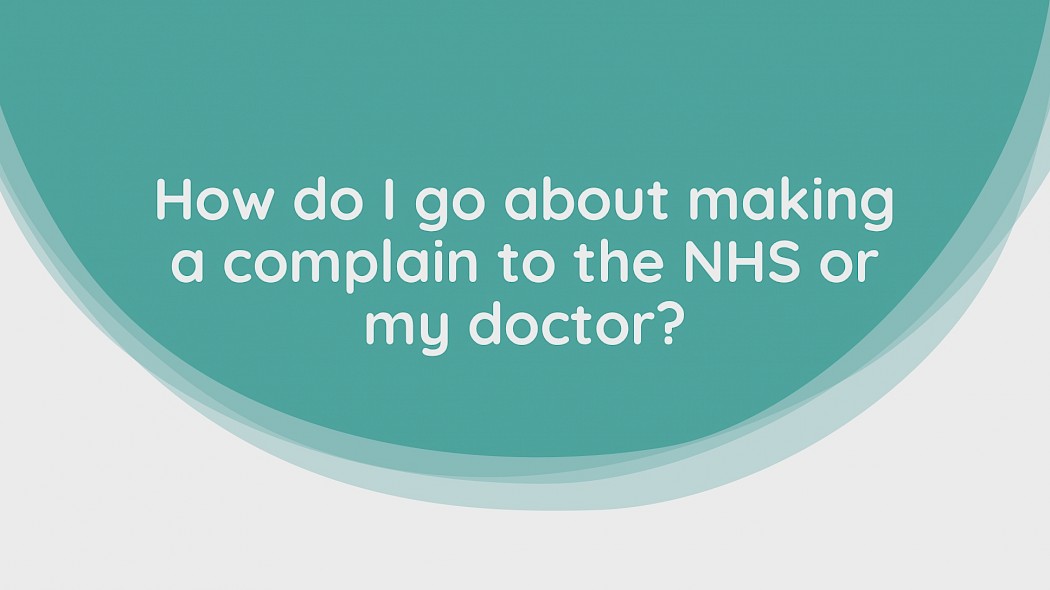Understanding how to complain about medical negligence is really important. If you’re unsure about raising a complaint, we’re here to help you through this process. Partnering with us and gaining the help of a specialist medical solicitor during your complaints process can minimise stress in what we know is already a stressful situation.

To view this video please enable JavaScript, and consider upgrading to a web browser that supports HTML5 video
Remember that making a medical complaint differs from making a medical negligence claim (more on this later). However, even if you do have a medical negligence claim, you can still complain to your healthcare provider.
It is always best to draft a complaint in your own words. We can then review it before you send it off and suggest any additional questions you may not have thought of. We may also suggest requesting certain Guidelines and policies from the care provider.
How Do I Complain about Medical Negligence?
How you file a medical complaint can vary slightly depending on what type of service you receive. In this guide, we explain how to complain about medical treatment when dealing with the following types of providers:
What Should I Include When Making a Formal Medical Complaint?
If you want to complain about medical treatment, you need to ensure you include key pieces of information in your complaint, including:
- What/who you are making a complaint about, so setting out a background of what happened in your own words.
- The occurrence and when it took place
- Your demands to resolve the complaint, which could just be an apology and/or an answer to your questions.
- Any relevant contact details so they can send updates on your complaint investigation and the response to you.
How Much Time Do I Have to Make a Medical Complaint?
The good news is that you typically have up to a year to complain from when the incident occurred or when it came to your attention. Under special circumstances, the care provider may still consider your complaint, so do not be put off from raising one.
However, wherever possible, it is advised that you make your complaint within six months of the incident you are complaining about or the realisation of that incident. This helps to ensure everybody involved can clearly remember what happened. For example, if your complaint is against a Hospital, then a copy of the complaint letter should be sent to those involved in providing your treatment, for them to consider and provide their comments. Most organisations will have their own policies on timeframes for considering a complaint.
You should also be aware that there is a three-year time limit for starting a medical negligence claim, which is a different process from making a complaint; the three years start from either the date of the occurrence or from the date you realised treatment was potentially negligent.
In special cases, the Court may grant an exception and allow a case to proceed out of time. Regardless, we would always advise starting your claim as early as possible. If you are concerned about time limits, please don’t hesitate to get in touch, and we’ll advise you on the best course of action.
What Is the Difference Between a Medical Complaint and a Medical Claim?
When complaining about medical treatment, you should first be aware of the difference between a complaint and a claim.
- Bringing a complaint: You don’t have to have suffered an injury during medical care to complain about medical treatment.
- Making a medical negligence claim: You need evidence that you have been injured due to negligence to bring a medical negligence claim.
So, if you’re unhappy with your medical experience but you haven’t suffered harm as a result, you may consider making a complaint rather than a claim.
Do I Have Rights When Making a Complaint?
When complaining about medical treatment with the NHS, you have certain rights. After all, NHS workers must be transparent about any investigation involving you.
- Your medical complaint must be investigated and dealt with properly, and you must be told the result of it.
- You can take your complaint further to the Parliamentary and Health Service Ombudsman if you are unsatisfied with the response.
- You can request a Judicial Review if an unlawful approach has directly impacted you.
- You can pursue a case for compensation if you have suffered an injury as a consequence of negligent treatment.
Is It Worth Complaining about the NHS?
It is undoubtedly worth complaining about the NHS if you are unsatisfied with one of its services. We recommend letting the care provider know about your issues sooner rather than later to resolve your complaint swiftly.
Many issues discussed with the NHS are sorted out at an early stage, although you could get a third party involved if you feel uncomfortable discussing matters with someone involved in your medical treatment. Raising a complaint may also help change practices and that could mean avoiding the same happening to someone else.
How to Complain about Medical Negligence: Taking Things Further
How you can take a medical complaint further will really depend on what complaint you are trying to make. Here is an overview of some of the organisations that may be able to help you with the procedure of bringing a complaint:
The CQC is the health and social care regulator for England. You can take your complaint further with them if you are not happy with the response to your complaint that was made directly to the medical care provider.
If you aren’t satisfied with how an NHS service has handled a complaint, you can write to the free-of-charge Ombudsman within twelve months of realising you have a complaint. You may be able to request assistance after this period in certain circumstances.
Note that the Ombudsman can only investigate specific complaints, and you must have obtained a final response before the Ombudsman can investigate your problem.
The GMC can investigate any complaints about a doctor, although it cannot award compensation. Instead, they can take action ranging from a warning letter to restricting or removing the doctor’s right to practice medicine in the most serious cases.
In the first instance, you should raise a concern using their online form.
Additional Support with Your Medical Complaint
If you require support or extra assistance with complaining about medical treatment, you may access assistance from independent advocacy services. There are many available around the country, including:
- Cloverleaf Advocacy Service – free and confidential advocacy from an independent charity
- VoiceAbility – independent support for disabled adults and family carers
- Mind – a charity working to improve the lives of people with mental health problems
- Age UK - a national charity aiming to create a world where every older person feels included and valued
- The Advocacy People - free and confidential advocacy from an independent charity
- Advocacy First - free and confidential advocacy from an independent charity
- Sandwell Advocacy – a community-based organisation providing high quality advocacy support
- POhWER - free and confidential advocacy from an independent charity
- OPAALUK – independent advocacy services for older people, and those who support them
Complain about Medical Treatment with Medical Solicitors
Our experienced team of specialist solicitors here at Medical Solicitors can help guide you if you are unhappy with the medical treatment you received. Whether you’re looking to make a medical negligence claim or a negligence complaint, we are here to talk you through our process and provide free, no-obligation legal advice.
Please don’t hesitate to contact our friendly team and schedule a chat today.











